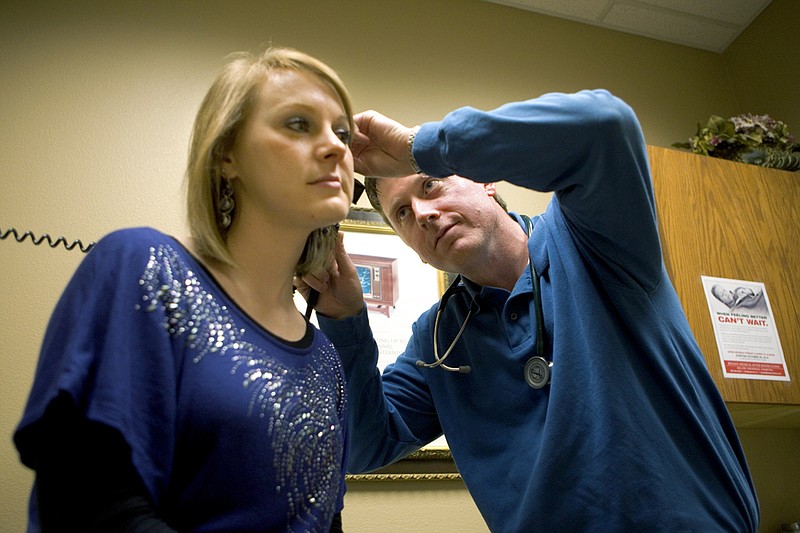The flu season started early in Arkansas, and local hospitals have seen many more patients test positive for influenza in the first weeks of the year.
Medical personnel at Saline Memorial Hospital in Benton said they did not see any cases of the flu until Dec. 1. Then, for the rest of the month, they had an average of one patient a day test positive for the flu.
“On Dec. 24, positive flu tests increased dramatically,” said Michelle Parish, manager of the emergency department at Saline Memorial. “The last week of 2012, we had 16 [patients test] positive for flu. Seven patients over the age of 65 had pneumonia.”
Since Jan. 1, Saline Memorial’s emergency department has recorded 68 positive tests for the flu, with 28 patients, age 65 or older, with pneumonia, as of Tuesday.
“Many more patients have been treated but not tested for influenza-like illness,” Parish said.
In Malvern, Jenelle Crofford, infection-control nurse for Hot Spring County Medical Center, said the hospital had only one confirmed case of the flu in November, although staff tested 46 people. In December, the staff conducted 216 flu tests and had 51 cases confirmed.
“We don’t have the number yet for January, but we had several cases in-house last week,” she said. “This is the most active season that we have seen in the last several years.”
The Arkansas Department of Health is receiving a large number of reports of flu infections and hospitalizations from all regions of the state. Nine deaths from the flu have been reported to the agency.
Nationwide, the Centers for Disease Control and Prevention announced that this is the worst flu season since 2009, and the outbreak has exceeded epidemic levels. Arkansas health officials have said that 13 people have died from the flu in the state as of mid-month, and William Schaffner of the department of preventative medicine at Vanderbilt University School of Medicine in Nashville, Tenn., has said 36,000 deaths may come nationwide as a result of the infections persisting into February and even March.
State Health Department officials and doctors from hospitals in the Tri-Lakes region encourage everyone 6 months old and older to get a flu shot. The Health Department said a vaccination provides 60 to 80 percent protection against the flu and can be as much as 90 percent effective against flu-related hospitalization.
“The vaccine [now available] has this particular strain included in it,” said Dr. Idress Mogri, a pulmonologist and critical-care physician at Mercy Hospital Hot Springs. “It cannot be emphasized enough how important it is to vaccinate because this is a completely preventable disease. Nobody has to die from it.”
Most of the time, symptoms can include fever or chills, sore throat, body aches, fatigue, cough, headache and a runny or stuffy nose, according to the CDC. However, young children, people 65 and older, pregnant women and people with certain health conditions or weakened immune systems can get much sicker. Often for them, flu can cause high fever and pneumonia and make existing medical conditions worse. In children, the flu can cause diarrhea and seizures.
Dr. Tyler Nelson, who practices internal medicine at the Bryant Medical Clinic, said the flu patients he has been treating were very ill.
“Most of the people we have been seeing are pretty sick, even though in their 20s and 30s,” he said. “Those who are older are in danger of having it develop into pneumonia.”
Nelson said he has even seen some patients who had taken a flu shot but still came down with the flu.
“Some can get the vaccine but still have it, but they are only sick for a day or two, so they got some protection from it,” the doctor said. “The majority of flu patients did not get the vaccine, and that is why we beg our patients to take it.”
In addition to the flu vaccine, there are many things an individual can do to decrease the spread of germs this season.
• Use a tissue to cover your mouth when coughing or sneezing. Use your upper sleeve or elbow if tissues are unavailable.
• Put used tissues in the trash.
• Do not touch your eyes, nose or mouth.
• Wash your hands often (for at least 20 seconds each time), especially after a cough or sneeze. Use an alcohol-based wipe or gel sanitizer when soap and a sink are not nearby.
• Avoid those who are sick. If that is not an option, stay 6 feet away from them, and wash your hands before and after visiting.
• Sanitize household surfaces with disinfecting wipes.
Nelson said not as many flu patients have come to his office this week, the first decline since early December.
“Maybe the outbreak is tapering off here, but it isn’t over,” he said.
CDC epidemiologists said the flu will continue to linger across the country, even as it moves to the Western states.
“The peak of this season has yet to come. We are five weeks into what will most likely be a 12-week period,” Mogri said. “The precautions have to be continued all the way until the end.”
Staff writer Wayne Bryan can be reached at (501) 244-4460 or wbryan@arkansasonline.com.
